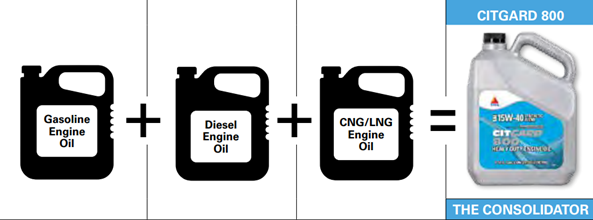

Transportation and logistics companies around the globe are adding vehicles with Compressed Natural Gas (CNG) engines to their fleets alongside their traditional diesel and gas engines. CNG engines boast strong advantages like improved fuel efficiency and reduced emissions, but there are common concerns that come with maintaining a mixed-engine fleet, including inventory planning, cost management, and oil misapplication. Applying the wrong oil to an engine can cause start-up issues, leaks, poor performance, and more, and it's bound to happen when servicing a fleet with multiple engine types. Fortunately, a new type of oil is helping companies avoid these catastrophes.
Typically, a fleet with multiple engine types calls for multiple oil types. For example, diesel engine oil and gasoline engine oil traditionally have several differences including:
As stated, these are among the differences between diesel engine oil and gas engine oil. Nowadays, many organizations are adding compressed natural gas engines to the mix, which have their own unique needs. In the past, it was never recommended to use diesel and gas oil interchangeably, but due to advancements in technology and new oil formulations, there is now a way to streamline inventory and satisfy all engine needs with one oil.
Each engine type requires a unique formula of oil. However, an alternative would be an oil that could be applied to all engine types. Today, there are options like CITGARD 800. This lubricant meets the API SN approval requirements for gasoline engines, is fortified with the CITGO SootArrest® technology to address soot dispersion in diesel applications and provides excellent lubricity in natural gas engines.
Based on the differences between diesel engine oil and gas engine oil, you might be hesitant to consider using one oil to meet the needs of two or three different engine types. With CITGARD 800, the key to consistent performance in multiple applications is the additive blend.

The right additive technology should deliver superior oxidation and nitration protection combined with a shear stability improver to maintain viscosity, ensuring wear protection in severe applications. The right formulation for a consolidated lubricant provides superior engine deposit control, reducing the tendency for valve guttering due to higher combustion temperatures in CNG engines and oil oxidation in the higher operating temperatures of modern diesel engines.
There is significant value in using one oil for all engine types, and it all boils down to efficiency in both inventory planning and maintenance. Keep in mind that users only see the benefits if the chosen oil is carefully formulated to not just operate in multiple engine types, but operate optimally.
Tracking and ordering multiple engine oils can become inconvenient, especially with the uncertainty in the supply chain. Having one engine oil allows you to more easily estimate oil consumption and keep a sufficient amount in storage at all times.
When servicing a fleet, technicians must perform several tune ups and inspections to ensure optimal safety and performance of the vehicles, many of these requiring unique tools and parts. In the midst of these maintenance tasks, it can be easy to grab the wrong oil, or worse, purposely choose an unsuitable oil if the correct one is out of stock. Based on Noria's Lubrication Program Development experience, this type of application risk has shown to be one of the most costly aspects to unconsolidated or mislabeled lubricant products. One oil ensures the right oil is applied every time.
By ensuring a suitable engine oil is applied every time, your engine lasts longer and performs better, minimizing the need for costly repairs. Furthermore, an engine oil that is formulated for superior oxidation resistance and acid neutralization can also extend oil drain intervals, resulting in fewer oil purchases throughout the year.
In decades past, using one oil for multiple engine types was unheard of due to the varying needs of each engine. Today, companies can streamline their inventory and simplify maintenance practices by using an oil that is formulated to not only meet the needs of diesel, gas, and CNG engines, but provide superior protection for engine components. To learn more about CITGARD 800, visit CITGARD 800 Engine Oil.
